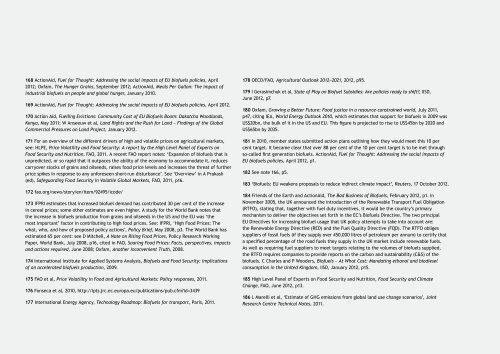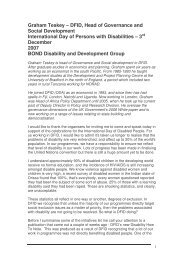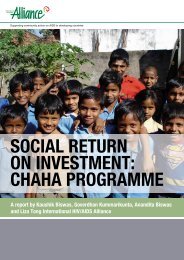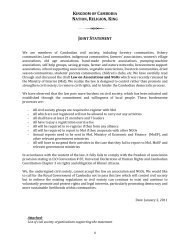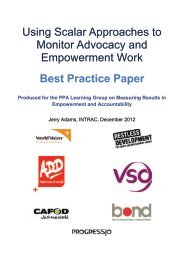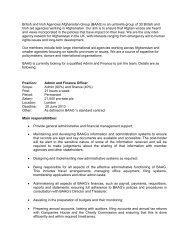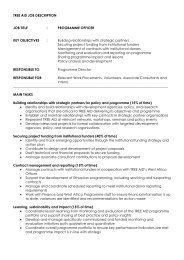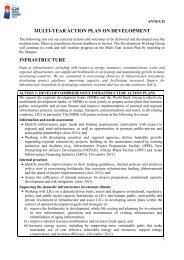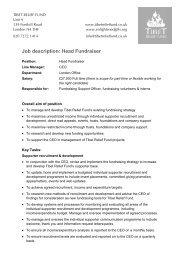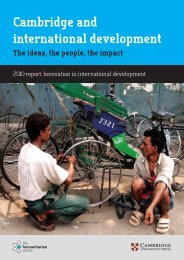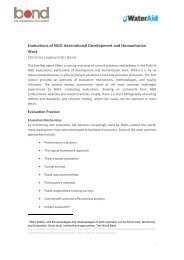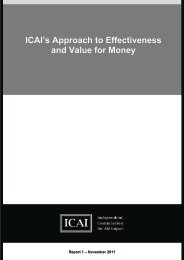THE NEED FOR UK ACTION ON GLOBAL HUNGER - Enough Food IF
THE NEED FOR UK ACTION ON GLOBAL HUNGER - Enough Food IF
THE NEED FOR UK ACTION ON GLOBAL HUNGER - Enough Food IF
Create successful ePaper yourself
Turn your PDF publications into a flip-book with our unique Google optimized e-Paper software.
168 actionaid, Fuel for Thought: Addressing the social impacts of EU biofuels policies, april2012; oxfam, The Hunger Grains, september 2012; actionaid, Meals Per Gallon: The impact ofindustrial biofuels on people and global hunger, January 2010.169 actionaid, Fuel for Thought: Addressing the social impacts of EU biofuels policies, april 2012.170 action aid, Fuelling Evictions: Community Cost of EU Biofuels Boom: Dakatcha Woodlands,Kenya, may 2011; w anseeuw et al, Land Rights and the Rush for Land – Findings of the GlobalCommercial Pressures on Land Project, January 2012.171 for an overview of the different drivers of high and volatile prices on agricultural markets,see: hlpe, Price Volatility and <strong>Food</strong> Security: A report by the High Level Panel of Experts on<strong>Food</strong> Security and Nutrition, fao, 2011. a recent fao report notes: ‘expansion of biofuels that isunpredicted, or so rapid that it outpaces the ability of the economy to accommodate it, reducescarryover stocks of grains and oilseeds, raises food price levels and increases the threat of furtherprice spikes in response to any unforeseen short-run disturbance’. see ‘overview’ in a prakash(ed), Safeguarding <strong>Food</strong> Security in Volatile Global Markets, fao, 2011, p16.172 fao.org/news/story/en/item/92495/icode/173 IfprI estimates that increased biofuel demand has contributed 30 per cent of the increasein cereal prices; some other estimates are even higher. a study for the world bank notes thatthe increase in biofuels production from grains and oilseeds in the us and the eu was ‘themost important’ factor in contributing to high food prices. see: IfprI, ‘high food prices: Thewhat, who, and how of proposed policy actions’, Policy Brief, may 2008, p3. The world bank hasestimated 65 per cent: see d mitchell, A Note on Rising <strong>Food</strong> Prices, policy research workingpaper, world bank, July 2008, p16, cited in fao, Soaring <strong>Food</strong> Prices: Facts, perspectives, impactsand actions required, June 2008; oxfam, Another Inconvenient Truth, 2008.174 International Institute for applied systems analysis, Biofuels and <strong>Food</strong> Security: Implicationsof an accelerated biofuels production, 2009.175 fao et al, Price Volatility in <strong>Food</strong> and Agricultural Markets: Policy responses, 2011.176 fonseca et al, 2010, http://ipts.jrc.ec.europa.eu/publications/pub.cfm?id=3439177 International energy agency, Technology Roadmap: Biofuels for transport, paris, 2011.178 oecd/fao, Agricultural Outlook 2012–2021, 2012, p95.179 I gerasimchuk et al, State of Play on Biofuel Subsidies: Are policies ready to shift?, IIsd,June 2012, p7.180 oxfam, Growing a Better Future: <strong>Food</strong> justice in a resource-constrained world, July 2011,p47, citing Iea, World Energy Outlook 2010, which estimates that support for biofuels in 2009 wasUS$20bn, the bulk of it in the US and EU. This figure is projected to rise to US$45bn by 2020 andus$65bn by 2035.181 In 2010, member states submitted action plans outlining how they would meet this 10 percent target. It became clear that over 88 per cent of the 10 per cent target is to be met throughso-called first generation biofuels. ActionAid, Fuel for Thought: Addressing the social impacts ofEU biofuels policies, april 2012, p1.182 see note 166, p5.183 ‘biofuels: eu weakens proposals to reduce indirect climate impact’, Reuters, 17 october 2012.184 friends of the earth and actionaid, The Bad Business of Biofuels, february 2012, p1. Innovember 2005, the uK announced the introduction of the renewable Transport fuel obligation(rTfo), stating that, together with fuel duty incentives, it would be the country’s primarymechanism to deliver the objectives set forth in the ec’s biofuels directive. The two principaleu directives for increasing biofuel usage that uK policy attempts to take into account are:the renewable energy directive (red) and the fuel quality directive (fqd). The rTfo obligessuppliers of fossil fuels (if they supply over 450,000 litres of petroleum per annum) to certify thata specified percentage of the road fuels they supply in the <strong>UK</strong> market include renewable fuels.as well as requiring fuel suppliers to meet targets relating to the volumes of biofuels supplied,the rTfo requires companies to provide reports on the carbon and sustainability (c&s) of thebiofuels. c charles and p wooders, Biofuels – At What Cost: Mandating ethanol and biodieselconsumption in the United Kingdom, IIsd, January 2012, p15.185 high level panel of experts on food security and nutrition, <strong>Food</strong> Security and ClimateChange, fao, June 2012, p13.186 l marelli et al, ‘estimate of ghg emissions from global land use change scenarios’, JointResearch Centre Technical Notes, 2011.64


